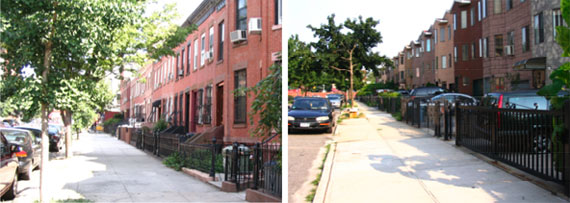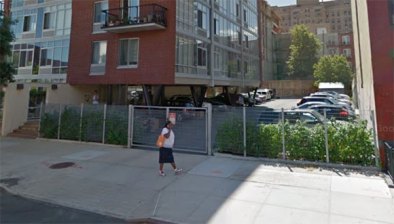Report: NYC’s Off-Street Parking Policy Will Set Off a Traffic Explosion

Adjacent blocks in Park Slope, one built before parking requirements took effect, and one built after.
If New York City maintains current parking policies, the traffic generated by the addition of new off-street spaces will likely exceed a billion miles per year by 2030, according to a report released yesterday by Transportation Alternatives. That distance is roughly equal to eight months’ worth of all driving in Manhattan below 86th Street. By comparison, congestion pricing is projected to cut traffic by less than half that amount.
The report, "Suburbanizing the City" [PDF], is the first to address the effects of off-street parking requirements on traffic. The report’s authors, who include University of Planning Professor Rachel Weinberger, and Streetsblog contributor John Kaehny, conclude that developers are essentially required to build higher levels of car ownership into the very fabric of the city — between 40 and 50 percent above current levels. In many cases the inclusion of parking is mandated by the city’s zoning requirements. This is a recipe for induced demand: The more parking is provided with new residences, the more people will drive.
"As the pace of residential development is speeding up to provide for a growing population, this increase in the parking supply will unleash a torrent of unnecessary car ownership, unnecessary driving, and unnecessary traffic and pollution," said T.A.’s Paul Steely White. "All of this traffic trouble will largely erase the transportation improvements and carbon savings from PlaNYC."
One of the barriers to addressing the problem is a lack of information. The report notes that the Department of City Planning neither tracks the cumulative amount of parking in the city, nor measures the impact of parking on traffic and pollution. The proliferation of accessory parking in Hell’s Kitchen and the possible addition of a 2,300-car Costco garage on the Upper West Side are symptoms of the city’s ad-hoc approach to parking management. All told, says report author Rachel Weinberger, the biggest impact on traffic might come from the construction of smaller, one- to three-family residences required to include off-street parking.
A broad coalition of planning and environmental groups co-issued the report. Streetsblog will have more on yesterday’s joint press conference (also see articles in AM New York, Metro, the Post, and the Sun) and recommendations for addressing the parking glut. Key findings from the report follow the jump.
- In many cases, the city’s residential off-street parking
requirements exceed existing off-street parking. As a
result, new residences built under the zoning code will
have far more parking than existing residences. This will
shift neighborhoods from pedestrian-oriented to more
car-oriented places and undermine their pedestrian character. -
New York City zoning regulations mandating parking at
new residential developments will increase auto ownership rates and add over 1 billion annual vehicle miles
traveled (VMT) by 2030. This is 40% to 50% more than
if the City were to maintain its existing rate of car ownership. (A billion VMT is equivalent to 8 months of traffic in Manhattan south of 86th Street.)
Auto use associated with required parking at new housing will add over 431,000 metric tons of CO2 per year
by 2030. (By comparison, the city’s new, high-mileage,
“green” taxis and black car initiative will reduce CO2
emissions by 351 thousand tons a year.) - Residents of new residential development are at least
40% to 50% more likely to own automobiles than today’s New Yorkers. - The Department of City Planning lacks crucial information for making informed decisions about the amount of
off-street parking it requires in the Zoning Resolution.
The agency does not know how much parking there is,
how much is required, or how much driving new park-
ing will produce. - There is no evidence to suggest that reducing off-street parking requirements would lead to less development,
lower growth or other negative consequences.
